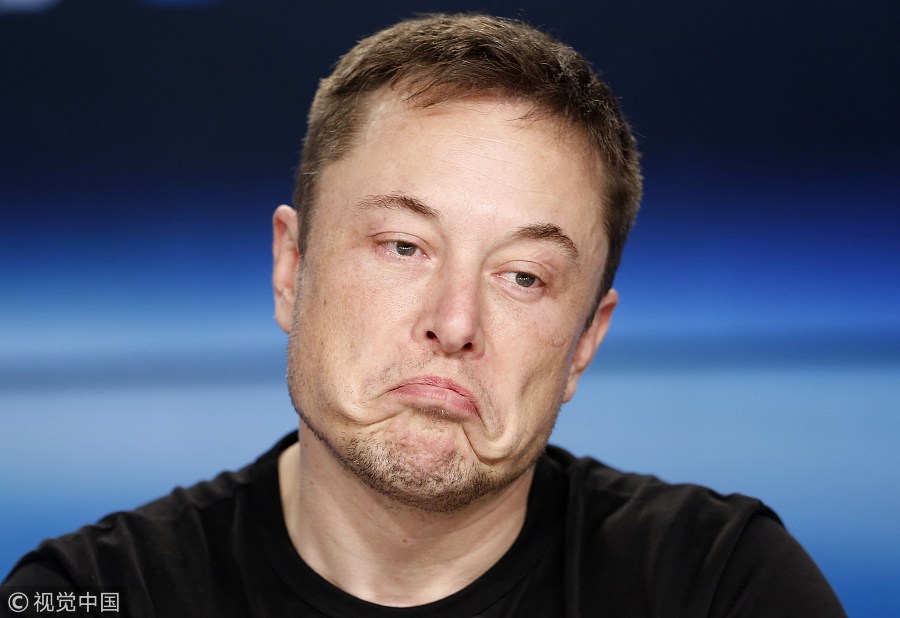Back to Earth: Tesla's losses grow on Model 3 delays
Updated: 2018-02-09 09:04

The day after Tesla and SpaceX CEO Elon Musk blasted his Tesla Roadster into space, his electric car company's mounting losses brought him back to Earth again.
Tesla Inc posted a record quarterly net loss of $675 million in the fourth quarter, up from a net loss of $121 million in the same period a year ago. The Palo Alto, California-based automaker is struggling to meet production targets for its first mass-market car, the Model 3 sedan. It's also spending heavily on future vehicles, including a semi that's supposed to go into production next year.
Tesla lost $1.96 billion for the full year, a record for the company and nearly three times its loss of $675 million in 2016. Tesla has never made a full-year profit since it went public in 2010.
Tesla's adjusted fourth-quarter loss of $3.04 per share was ahead of Wall Street's estimated loss of $3.15 per share, according to analysts polled by FactSet. The adjusted loss eliminates onetime expenses, including stock-based compensation. Revenue for the quarter was $3.3 billion, which was in line with analysts' forecasts.
Tesla's total revenue for 2017 was $11.8 billion, which was also in line with analysts' forecasts.
Musk is a masterful marketer, and the red ink may not stem investors' excitement. The company's shares jumped 3 percent to close at $345 on Wednesday after SpaceX successfully launched its Falcon Heavy rocket with Musk's cherry red Roadster as its cargo. The convertible, with a dummy in a space suit at its wheel, is now heading toward an asteroid belt between Mars and Jupiter.
While Tesla's true believers love these stunts, some analysts are questioning whether Musk should be spending more time fixing Tesla's woes. Clement Thibault, a senior analyst with the website Investing.com, grumbled about Musk's recent fundraising efforts for The Boring Co, his new tunnel-drilling company.
"He appears to be more eager to sell hats and flamethrowers rather than meeting previously stated production targets for Tesla vehicles," Thibault wrote in a note to investors.
Musk said Tesla has learned some valuable lessons about production and is steadily resolving problems with the Model 3. For example, he said, the company has nearly completed an automated battery module assembly line which will speed production at its Nevada battery factory.
"If we can send a Roadster to the asteroid belt, we can probably solve Model 3 production. It's just a matter of time," Musk said on a conference call with analysts.
Here are some issues Tesla is facing:
Shifting targets: Tesla delivered 103,181 vehicles last year, up 35 percent over 2016 and ahead of its targets. But it fell woefully short on the Model 3, which went into production in July. Tesla made just 2,425 Model 3s in the fourth quarter and has pushed back production targets multiple times. On Wednesday, Musk reiterated Tesla's most recent guidance, saying Tesla plans to be making 10,000 Model 3s per month by the end of the first quarter and 20,000 per month by the end of the second quarter.
CEO pay: This will be Musk's first earnings call since last month's announcement of a proposed all-or-nothing pay package for him. The package requires Tesla, which is worth a little less than $60 billion now, to grow in $50 billion leaps to a staggering $650 billion market capitalization over the next decade. If Tesla doesn't meet those goals, Musk won't get paid. If it does, the package could vault him into the ranks of the world's richest people.
Cash burn: Tesla has lofty targets, including building a plant in China and launching a small SUV in 2020. It's also on the hook to build charging stations for its network of semi trucks. All that costs money, which Tesla is burning through at a fast clip. Tesla ended the fourth quarter with $3.4 billion in cash; its capital expenditures were $3.4 billion in 2017 and it said they will likely grow slightly this year as the company adds more stores, service centers and fast-charging Supercharger stations.
China has been one of the fastest-growing markets for Tesla. According to statistics from the China Passenger Car Association, the company delivered 13,500 cars to China in the first three quarters of 2017, more than double from a year earlier.
Analysts say its sales in the world's largest car market would grow even further if it can improve the production of the cheaper Model 3 sedan.
Tesla unveiled plans to produce the Model 3 sedan and the upcoming Model Y crossover in China in about three years. It confirmed to China Daily late last year that it was in talks with the Shanghai municipal government to build a plant in the region.
Cui Dongshu, secretary-general of CPCA, said Tesla's decision to make cars in China would be a win-win move as it will not only boost its sales, but also set a good example in quality for new energy carmakers in the country.
AP - China Daily
























